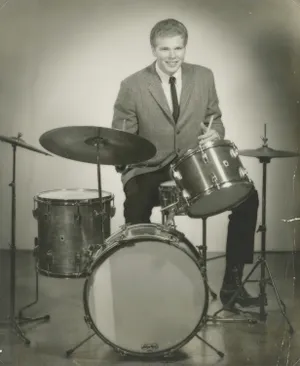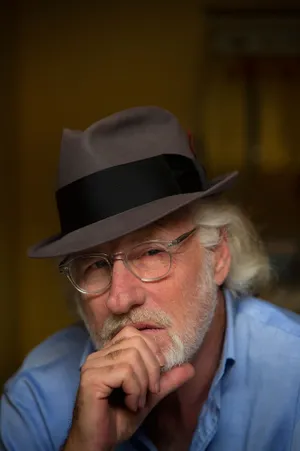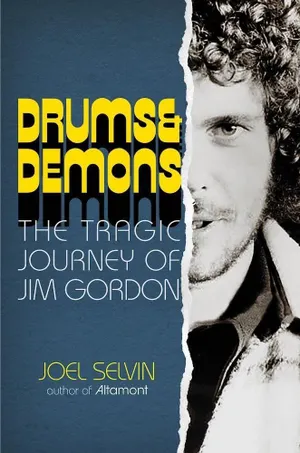Life of drummer Jim Gordon, who played on 'Layla' before he killed his mother, examined in new book
Even most music aficionados aren’t immediately familiar with the name Jim Gordon.
A brilliant drummer, christened as such by no less than Ringo Starr and Eric Clapton, Gordon could be heard on songs that have become musical fabric: Carly Simon’s “You’re So Vain,” Sonny and Cher’s “The Beat Goes On,” Mike Post’s (a childhood friend of Gordon) theme from “The Rockford Files” and hundreds of works from some of the most revered names in rock.
His pedigree and talents were unquestionable.
But, as Joel Selvin’s compelling book, “Drums & Demons: The Tragic Journey of Jim Gordon” (Diversion Books, 278 pp., available now) reveals in deeply researched detail, Gordon’s struggles with mental illness – schizophrenia, specifically – led not to mere peccadillos, but unspeakable heartbreak.
In June 1983, Gordon, impelled by voices in his head, killed his 71-year-old mother, Osa, with a hammer and butcher knife in her Los Angeles-area home.
Check out: USA TODAY's weekly Best-selling Booklist
Gordon was serving his 16-years-to-life sentence for second-degree murder when he died of natural causes in March 2023 at California Medical Facility in Vacaville. He was 77.

Who was Jim Gordon?
A drummer from the time he was 8 and turned over a wastebasket and pots and pans for a makeshift kit, Gordon was discovered by Joey Paige, the bassist and musical director for the Everly Brothers, while playing in a club with one of his teenage bands.
Touring the world with the Everlys provided Gordon an education on life outside of suburban Southern California, but Gordon was keen to pursue the then burgeoning – and potentially lucrative – world of session playing.
“Jim was knocking on every door, making all the phone calls, doing whatever he could to work his way into the recording studio scene,” writes Selvin, the longtime music critic for the San Francisco Chronicle who has also penned books about The Rolling Stones and Altamont and Sammy Hagar, among others. “People began paying attention; it was hard not to notice the gangly, tall blond with the curly locks and shy smile.”
Gordon, in his early years as a musician, was regarded as not only the type of drummer who could slip into any groove with a distinctive touch, but a pleasant, quiet, always-prepared professional who learned from one of the most venerable session players, Hal Blaine.

More:Willie Nelson, Bob Dylan, John Mellencamp set to headline Outlaw Music Festival Tour
Gordon played drums on Clapton's 'Layla' and The Beach Boys' 'God Only Knows'
Gordon’s mentor, Blaine, recommended the prodigy to Brian Wilson, who was ensconced in the studio crafting The Beach Boys’ seminal 1966 album, “Pet Sounds.” That’s Gordon you hear playing on “God Only Knows” and the beautifully byzantine “Heroes and Villains.” In true in-demand-session-man form, Gordon was bouncing between working with Wilson and adding percussion to the recording of Ike and Tina Turner’s “River Deep – Mountain High.”
Gordon’s extensive playlist, which Selvin helpfully curates a portion of in the epilogue of the book, is a seesaw of styles from a mélange of artists. Just a sampling: Merle Haggard (“I’m a Lonesome Fugitive”); Tiny Tim (“Tiptoe Through the Tulips”); Crosby, Stills & Nash (“Marrakesh Express”); Joe Cocker (“The Letter”); Nilsson (“Coconut”); Helen Reddy (“I Am Woman”); Steely Dan (“Rikki Don’t Lose That Number”); The Muppets (“Rainbow Connection”).
Jim Gordon’s mental illness takes root
But despite his continued success, Gordon’s demons were intensifying.
While touring with Cocker in 1970, which Selvin likens to “a traveling summer camp with sex, drugs and rock & roll,” Gordon’s mental illness, coupled with him “smoking, snorting, drinking and dropping anything people gave him,” led to a burst of violence.
His girlfriend at the time, singer Rita Coolidge, thought Gordon was going to propose when he asked her to meet him in their hotel hallway. Instead, writes Selvin, Gordon, “without a word, slammed her in the face with his fist as hard as he could … she slid down the wall and lay crumpled on the floor, unconscious.”
Coolidge soon ended the relationship. (Gordon would marry twice in his lifetime and has a daughter, Amy, who, along with her mother Jill and lifetime friend Mike Post, participated in Selvin’s book.)

Gordon would always be inextricably linked to Coolidge in rock lore with his next move – joining Clapton, Carl Radle and Bobby Whitlock to form Derek and the Dominos, whose first assignment was as the house band for George Harrison’s 1970 opus, “All Things Must Pass.”
After a jam session with Duane Allman, Clapton enlisted the ace guitarist to play on Derek & The Dominos’ debut – and as it turned out, only – album, adding his “slashing, bottleneck guitar” to “Layla.”
But it was the piano coda on the classic rock behemoth, which Clapton heard Gordon and Coolidge playing months earlier in the studio, that cemented the song’s uniqueness.
The men share co-writing credit on “Layla” – which won a Grammy in 1993 from Clapton’s “Unplugged” album – but discounted Coolidge’s contribution.
Why did Jim Gordon murder his mother?
As the 1970s progressed, Gordon’s mental state decayed. He sought and received help from medical professionals, was given prescription medications and spent years checking into and leaving psychiatric facilities.
But the voices in his head – often imaginary commands from family members – smothered any attempts at lucidity.
Gordon turned down the opportunity to record with Bob Dylan and bolted from a new gig with Paul Anka in Las Vegas. He stopped eating, again controlled by voices, and became a recluse. His mother began to worry about her son’s deterioration to the point of documenting his threatening phone calls and calling the police who “advised Osa to keep her lights turned on and wished her luck.”
Two days later, Gordon arrived at his mother’s home and said, “I’m going to kill you.”
Later that night, cops found Gordon at his condo, lying in a fetal position on the floor. “I did it,” he said. “I’m sorry.”
Gordon was living in a cell barely bigger than his frame when the 1993 Grammy Awards were being shown on TV in the ward. Some of his prison mates knew of his history as a star rock 'n' roll drummer and urged him to watch his old friend Clapton on the telecast.
But, writes Selvin, "That life was dead to Jim ... his days in the sun were done, and regrets were useless."
Uninterested in the show, Gordon went down the hall to smoke a cigarette, but heard the cheers from his fellow inmates when his name was announced alongside Clapton's for the winning "Layla."
Even though it felt like a lifetime ago, Gordon couldn't help but smile.
More:Emma Heming Willis to publish caregiving book after husband Bruce Willis' dementia diagnosis

Disclaimer: The copyright of this article belongs to the original author. Reposting this article is solely for the purpose of information dissemination and does not constitute any investment advice. If there is any infringement, please contact us immediately. We will make corrections or deletions as necessary. Thank you.







